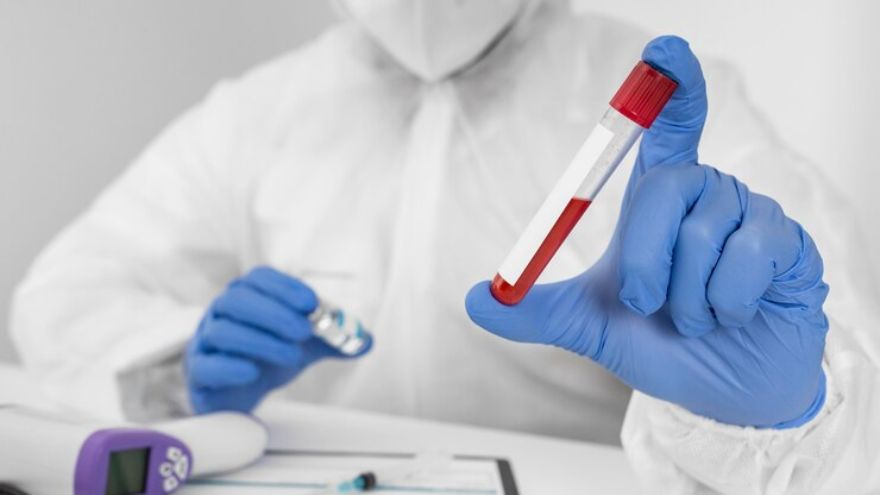
The Mean Corpuscular Hemoglobin (MCH) blood test is an important diagnostic tool used by healthcare providers to understand more about a patient's overall health, particularly their red blood cells. While many people might be familiar with common blood tests like Complete Blood Count (CBC) or lipid profiles, MCH is a more specialized measure that can reveal specific information about hemoglobin levels in red blood cells.
Hemoglobin is the protein in red blood cells responsible for carrying oxygen throughout the body. Any irregularities in hemoglobin levels can indicate various health issues, making the MCH test crucial in diagnosing and managing conditions such as anemia and other blood disorders.
In this blog post, we'll explore the MCH blood test in detail, covering what it is, how it works, why it’s important, and what the results might mean for your health.
What is MCH in a Blood Test?
MCH stands for Mean Corpuscular Hemoglobin. It’s a calculation that represents the average amount of hemoglobin found in a single red blood cell. Hemoglobin is critical because it binds to oxygen in the lungs and carries it to tissues throughout the body. Adequate oxygen supply is vital for the function of organs and tissues, making hemoglobin levels a key indicator of health.
The MCH value is derived from two other components of a Complete Blood Count (CBC) test:
- Hemoglobin (Hb): The total amount of hemoglobin in your blood.
- Red Blood Cell Count (RBC): The number of red blood cells in a specific volume of blood.
The formula for calculating MCH is as follows:
MCH (pg) = RBC count (millions/uL)/Hemoglobin (g/dL) ×10
MCH is expressed in picograms (pg), which is a unit of mass equal to one trillionth of a gram. The typical reference range for MCH is between 27 and 33 picograms per cell. Values outside this range may indicate an underlying health condition.
Why is the MCH Blood Test Important?
The MCH blood test is a valuable tool in diagnosing and monitoring several medical conditions, particularly those related to anemia and other red blood cell disorders.
1. Diagnosing Anemia:
- Low MCH Values: If your MCH value is lower than the normal range, it may indicate hypochromic anemia. This type of anemia occurs when there is not enough hemoglobin in the red blood cells, often due to iron deficiency. Iron is a critical component of hemoglobin, and a deficiency can lead to fewer oxygen-carrying cells.
- High MCH Values: Conversely, a higher-than-normal MCH value could indicate macrocytic anemia, where the red blood cells are larger than normal and contain more hemoglobin. This condition is often associated with vitamin B12 or folate deficiency.
2. Monitoring Chronic Conditions:
The MCH test can also be used to monitor chronic conditions that affect red blood cell production and hemoglobin levels. For instance, in chronic kidney disease, the kidneys may fail to produce enough erythropoietin, a hormone that stimulates red blood cell production, leading to anemia. Regular monitoring of MCH can help manage such conditions.
3. Evaluating Nutritional Status:
Since MCH levels can be influenced by vitamin and mineral deficiencies, the test can provide insights into a person's nutritional status. Low levels of iron, vitamin B12, or folate can lead to abnormal MCH levels, signaling the need for dietary changes or supplements.
4. Assessing Bone Marrow Function:
The bone marrow is responsible for producing red blood cells. Abnormal MCH levels might indicate bone marrow disorders, such as aplastic anemia or myelodysplastic syndromes, where the marrow fails to produce healthy blood cells.
What Do MCH Test Results Mean?
Understanding your MCH test results is crucial for identifying any underlying health issues. Here’s what different MCH levels might indicate:
Low MCH (Hypochromic Anemia)
A low MCH value, typically below 27 picograms, suggests that your red blood cells contain less hemoglobin than normal. This condition is often linked to iron deficiency anemia, which can result from:
- Poor Diet: Lack of iron-rich foods such as red meat, beans, and fortified cereals.
- Chronic Blood Loss: Conditions like heavy menstrual periods, ulcers, or gastrointestinal bleeding.
- Malabsorption: Diseases like celiac disease or Crohn's disease, which hinder the absorption of nutrients, including iron.
- Chronic Diseases: Conditions like chronic kidney disease or cancer can lead to anemia by reducing red blood cell production.
Symptoms of low MCH might include fatigue, weakness, pale skin, shortness of breath, and dizziness. Treatment typically involves addressing the underlying cause, such as iron supplementation for iron deficiency anemia.
High MCH (Macrocytic Anemia)
A high MCH value, usually above 33 picograms, indicates that your red blood cells are larger than normal and contain more hemoglobin. This condition is often associated with macrocytic anemia, which can result from:
- Vitamin B12 Deficiency: Essential for DNA synthesis in red blood cell production. Deficiency can cause larger red blood cells with more hemoglobin.
- Folate Deficiency: Like vitamin B12, folate is crucial for red blood cell production and its deficiency leads to similar issues.
- Alcoholism: Chronic alcohol consumption can interfere with the absorption of B vitamins and folate, leading to macrocytic anemia.
- Liver Disease: Conditions such as cirrhosis can lead to abnormal red blood cell production and higher MCH levels.
Symptoms of high MCH might include fatigue, weakness, pale or jaundiced skin, and neurological issues like numbness or tingling in the hands and feet. Treatment often involves addressing the deficiency or underlying condition, such as supplementing with vitamin B12 or folate.
Factors That Can Affect MCH Levels
Several factors can influence MCH levels, including:
1. Age and Gender:
MCH values can vary slightly based on age and gender. For example, women of childbearing age might have lower MCH levels due to menstrual blood loss, while older adults might have higher levels due to decreased absorption of vitamins.
2. Diet:
A diet lacking in essential nutrients like iron, vitamin B12, and folate can lead to abnormal MCH levels. Conversely, a well-balanced diet can help maintain normal levels.
3. Chronic Illnesses:
Conditions like chronic kidney disease, liver disease, and cancer can affect red blood cell production and MCH levels. These diseases often lead to anemia or other blood disorders.
4. Medications:
Certain medications, such as chemotherapy drugs or those affecting bone marrow function, can alter MCH levels. Some drugs might reduce red blood cell production, leading to lower MCH values.
5. Genetic Factors:
Inherited conditions like thalassemia or sickle cell anemia can affect hemoglobin production and red blood cell size, leading to abnormal MCH levels.
When is an MCH Blood Test Ordered?
An MCH test is usually ordered as part of a CBC test, which might be requested during a routine health check-up or when a patient presents symptoms that could indicate anemia or other blood disorders.
Common Symptoms Leading to an MCH Test:
- Chronic Fatigue: Persistent tiredness that doesn’t improve with rest might prompt a doctor to check for anemia.
- Pale Skin: Unusually pale skin could indicate low hemoglobin levels and prompt an MCH test.
- Shortness of Breath: Difficulty breathing, especially during physical activity, can be a sign of low oxygen levels in the blood.
- Dizziness or Lightheadedness: These symptoms can result from inadequate oxygen supply to the brain due to low hemoglobin levels.
The MCH test may also be ordered to monitor ongoing treatment for anemia or other blood disorders. For example, if a patient is being treated for iron deficiency anemia, regular MCH tests can help assess the effectiveness of the treatment.
Interpreting MCH Results in Context
While MCH is a valuable indicator of hemoglobin content in red blood cells, it should not be interpreted in isolation. Other components of the CBC, such as Mean Corpuscular Volume (MCV), Red Blood Cell Distribution Width (RDW), and overall hemoglobin concentration, are also important for a comprehensive understanding of a patient’s blood health.
For instance:
- MCV (Mean Corpuscular Volume): Measures the average size of red blood cells. Together with MCH, it helps determine the type of anemia. Low MCV and low MCH often indicate microcytic hypochromic anemia (iron deficiency), while high MCV and high MCH suggest macrocytic anemia (vitamin B12 or folate deficiency).
- RDW (Red Blood Cell Distribution Width): Indicates the variation in red blood cell size. A high RDW with abnormal MCH can suggest mixed causes of anemia.
Conclusion
The MCH blood test is a critical component of understanding your overall health, especially in relation to anemia and other red blood cell disorders. By measuring the average amount of hemoglobin in your red blood cells, the MCH test provides valuable insights that can help diagnose, monitor, and manage a variety of health conditions.
If your doctor orders an MCH test as part of a CBC, it’s important to understand what the results mean and how they relate to your overall health. Whether it’s a sign of a nutritional deficiency, a chronic disease, or a more serious condition, MCH levels can provide early warning signs that allow for timely and effective intervention.
By staying informed about your MCH levels and working closely with your healthcare provider, you can take proactive steps to maintain good health and address any potential issues before they become serious problems.
FAQs About the MCH Blood Test
1. What is the MCH blood test used for?
Ans. The MCH (Mean Corpuscular Hemoglobin) blood test measures the average amount of hemoglobin in each red blood cell. It is used primarily to diagnose and monitor anemia, assess red blood cell health, and evaluate underlying conditions affecting hemoglobin production and red blood cell function.
2. How is the MCH blood test performed?
Ans. The MCH test is typically part of a Complete Blood Count (CBC) test. A healthcare provider collects a blood sample from a vein, usually in your arm, using a needle. The blood is then analyzed in a laboratory to determine the MCH value, along with other blood components.
3. What are normal MCH levels?
Ans. Normal MCH levels typically range from 27 to 33 picograms per cell. However, reference ranges can vary slightly depending on the laboratory and individual factors like age and gender.
4. What does a low MCH result indicate?
Ans. A low MCH result generally suggests that your red blood cells contain less hemoglobin than normal, which is often associated with hypochromic anemia. This condition is commonly due to iron deficiency or chronic blood loss.
5. What does a high MCH result mean?
Ans. A high MCH result indicates that your red blood cells are larger than normal and contain more hemoglobin. This can be associated with macrocytic anemia, often caused by vitamin B12 or folate deficiency, or other conditions affecting red blood cell production.
6. What are some common causes of low MCH levels?
Ans. Common causes of low MCH levels include iron deficiency anemia, chronic blood loss, malabsorption issues (such as celiac disease), and certain chronic diseases like kidney disease.
7. What could cause high MCH levels?
Ans. High MCH levels can be caused by macrocytic anemia due to vitamin B12 or folate deficiency, chronic alcoholism, liver disease, or other conditions that affect red blood cell production and size.
8. How should I prepare for an MCH blood test?
Ans. No special preparation is typically needed for an MCH blood test. However, it's always a good idea to follow any specific instructions given by your healthcare provider, such as fasting or avoiding certain medications before the test.
9. What should I do if my MCH levels are abnormal?
Ans. If your MCH levels are abnormal, your healthcare provider will interpret the results in the context of your overall health and may recommend additional tests to determine the underlying cause. Treatment will depend on the diagnosis and could involve dietary changes, supplements, medications, or further medical evaluation.
10. Can MCH levels be affected by medications or health conditions?
Ans. Yes, certain medications and health conditions can affect MCH levels. For example, medications that impact red blood cell production or absorption of nutrients can alter MCH values. Chronic illnesses, such as kidney disease or liver disease, can also influence MCH levels. Always inform your healthcare provider about any medications you are taking or any existing health conditions you have.



